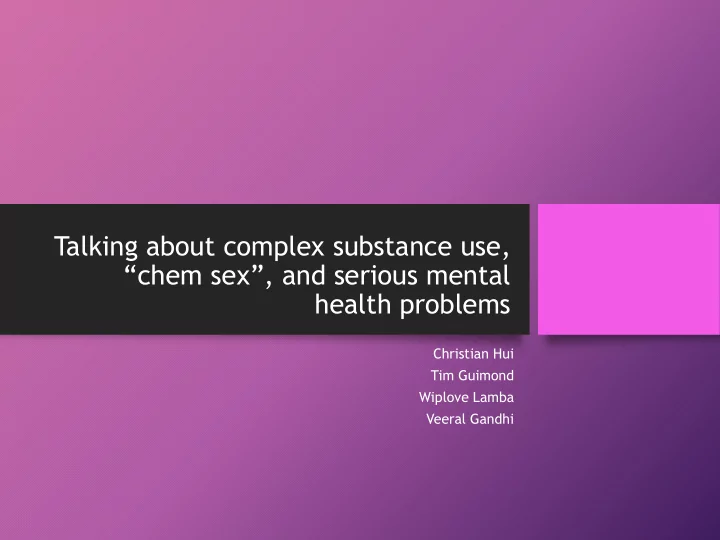

Talking about complex substance use, “ chem sex”, and serious mental health problems Christian Hui Tim Guimond Wiplove Lamba Veeral Gandhi
Presenter disclosure – Tim Guimond • Relationships with commercial interests • Grants/Research support: I have no financial connections to any pharmaceutical or medical device company • Speaker Honoraria: none • Consulting fees: none • Other: I do own a vegan restaurant with a liquor license (Cosmic Treats) and work as a psychiatrist in addictions – there’s some irony in that
Complexity • Mental health care is rich in complexity • It encompasses struggles that arise from different etiological paths (different causative mechanisms) • Highly stigmatized, similar to HIV • Poorly understood • Inadequately funded treatments and research and treatments • Many disorders have a chronic course • Disagreement within the field on diagnosis and treatment – various “orientations”
Perspectives of Psychiatry Paul R. McHugh & Phillip R. Slavney • Have • Are • Schizophrenia • Intelligence • Bipolar disorder • Personality Disease Dimension Behaviour Life Story • Do • Experience • Substance use • PTSD disorders • Demoralization • Sexual problems
Disease • Have it or don’t have it • “Broken part” is the etiology or cause • A normal process in the body has been broken • The ensuing dysfunction creates symptoms • These symptom clusters are recognized in diagnosis • Example: cough, fever, wheezes and crackles is recognized as pneumonia • Several different agents could be the ‘cause’
Dimension • Some characteristics of people exist on a spectrum: • Intelligence • Personality traits: Neuroticism, Extroversion/Introversion, Openness, Agreeableness, Conscientiousness • These are typically normally distributed • Society accommodates the middle of the distribution • Being at an extreme makes us vulnerable but not necessarily disordered
Behaviour Antecedents Behaviour Consequences (triggers) • External • What • Short term • people, • How often • Positive or place, time negative • How much • Internal • Mirror • How long antecedents • Thoughts, emotions, • Long term sensations • Positive or negative • Domains
Life Story • We all have a life story and it is personal and unique • The events in our lives craft our values, strengths, and beliefs • This is turn impacts the way we interpret new events, drive our expectations and give our lives meaning • Some stories are liberating and some confining so it is wise to write our story carefully • This story is continually written and can be rewritten
Perspectives of Psychiatry So What? Why think this way? • Biological treatments • Coaching to offset vulnerability • Proper diagnosis • Avoid precipitating situations Disease Dimension Behaviour Life Story • Behavioural therapy • Counselling • Change triggers and • Psychotherapy consequences
Our cases • Simple • Newly diagnoses Disease Dimension Behaviour Life Story • Complex • PTSD, BPD, SUD, BAD
Your cases Disease Dimension Behaviour Life Story
Recommend
More recommend